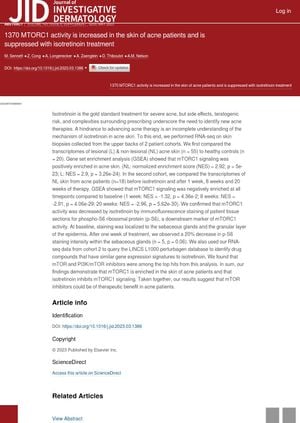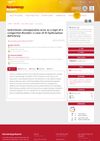MTORC1 Activity Is Increased in the Skin of Acne Patients and Is Suppressed With Isotretinoin Treatment
April 2023
in “
Journal of Investigative Dermatology
”

TLDR Acne patients have higher skin mTORC1 activity, which is reduced by isotretinoin treatment.
The study "1370 MTORC1 activity is increased in the skin of acne patients and is suppressed with isotretinoin treatment" conducted RNA-seq on skin biopsies from two patient cohorts to understand the mechanism of isotretinoin in acne skin. The first cohort compared the transcriptomes of lesional and non-lesional acne skin (n = 55) to healthy controls (n = 20), revealing that mTORC1 signaling was positively enriched in acne skin. The second cohort compared the transcriptomes of non-lesional skin from acne patients (n=18) before and after isotretinoin treatment, showing that mTORC1 signaling was negatively enriched at all timepoints compared to baseline. The study also confirmed that isotretinoin decreased mTORC1 activity by staining patient tissue sections for phospho-S6 ribosomal protein, a downstream marker of mTORC1 activity. The results suggest that mTOR inhibitors could be of therapeutic benefit in acne patients.
